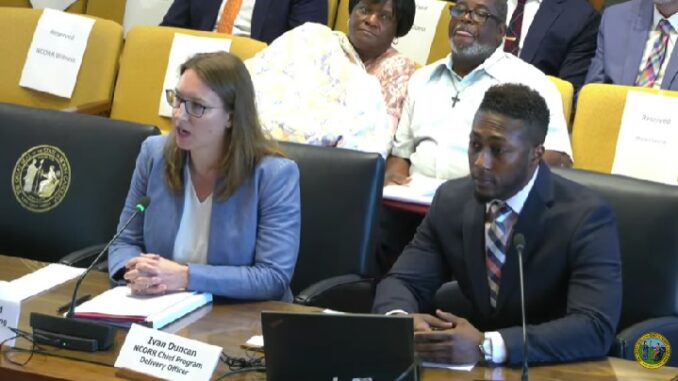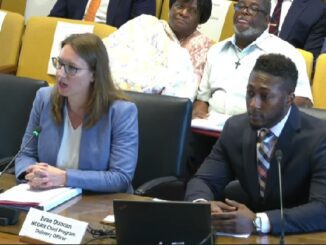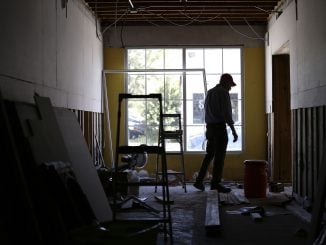
RALEIGH — The Hurricane Subcommittee of the Joint Legislative Committee on Government Operations held another hearing March 29 to receive updates from officials with the N.C. Office of Recovery and Resiliency (NCORR) and the Department of Public Safety (DPS).
Testimony was given by Laura Hogshead, director of NCORR, and Richard Trumper, senior adviser for disaster recovery for DPS. Trumper was named to that post beginning Feb. 1. He was previously the executive director of disaster recovery with the Office of State Budget and Management.
Trumper, who spoke at the end of the more than two-hour hearing, presented only a few slides that dealt mainly with increasing contractor participation in order to get work moving.
While the hearing was less tense than the prior two, at least one lawmaker — Sen. Brent Jackson (R-Sampson) — displayed displeasure with the continued slow progress.
Jackson grilled Hogshead on what families were being given priority, including those who were promised to be home before Christmas last year. Hogsheads said they were “absolutely” a priority.
“As I said, the ones that are out of their home are our top priority,” Hogshead said. “The ones that are in temporary relocation assistance have been, and continue to be, our top priority.”
Jackson asked the NCORR director how the public will be assured that the most vulnerable are being taken care of. Hogshead responded with, “you have my word on that.”
“Well, nothing personal about what I’m fixing to say at all, but based off prior history, your word isn’t worth a whole lot,” Jackson told Hogshead.
“Understood,” Hogshead replied.
Hogshead’s presentation showed 1,067 completed projects out of a total of 4,466 families seeking assistance as of March 28. The completion number represents 178 families now in homes over the previous number of 889 completed projects given to the subcommittee last December.
Hogshead had indicated that before the COVID-19 pandemic hit, the monthly average completion rate was 31 homes. During 2020, that average fell to 23. By 2021, the average completion rate dropped to just eight a month and the first six months of 2020 only saw an average of five homes completed.
As of Dec. 14, 2022, 191 projects were in active construction. Hogshead reported that as of March 28, 271 projects were in active construction.
At the subcommittee’s first meeting on Sept. 9, 2022, Hogshead said 4,100 applications had been taken since federal funds were received, but only 789 projects have been completed. During the Dec. 14 subcommittee meeting, she said 95 families had successfully been housed in the 83 days spanning the period from the last meeting on Sept. 9 through Dec. 7.
“In terms of general contractors, this is where the rubber meets the road,” Hogshead said. “We can have a perfect program, but if we don’t have enough general contractors to do the work then it won’t work at all.”
When asked about the status of the new contractors by Rep. Mark Pless (R-Haywood), Hogshead said a number of them were still in process and some are in training. She said there were 30 new contractors brought on in 2023 and they were being processed “within 15 days on average.”
Hogshead also said the general contractors working with them were reporting improved payment regularity.
Sen. Jim Perry (R-Lenoir) questioned the process of a vendor cutting checks to contractors.
“It sounds like we’re within an inch of making that happen,” said Perry. “But it sounded that way the last three meetings. What in the world is taking so long?”
Hogsheads replied they have contracted with a vendor for electronic payments and “that process has taken longer with Bank of America than anyone wants.” She added she can’t control how fast Bank of America works but that they were meeting with them daily.
Perry asked if her department had overpromised on the payment process and Hogshead put the blame on Bank of America.
“I would say that Bank of America did not understand how difficult it would be to switch to electronic payments,” Hogshead replied. She went on to say they should be “up to speed” and “making those payments in the next couple of weeks.”
NCORR has engaged Voluntary Organizations Active in Disaster (VOADs) directly to provide minor repairs, accessibility features for those with disabilities, and assistance with temporary relocation, according to Hogshead.
Hogshead noted her agency had assumed case management responsibilities from Horne in December 2022, as well as taking over the ReBuild NC Center management and Contact Center from Horne in January 2023.
Applicants were being better served through increased Center days/hours, her organization was actively recruiting more case managers and NCORR had established and trained an escalation team to handle more complex applications.
Continued focus areas per Hogshead include prioritization for families in the long-term Temporary Relocation Assistance program, enhanced constituent service through the NCORR Case Management team, active recruitment of general contractors, accelerating project completion by focusing on permitting and inspections, and utilization of new assignment threshold of $250,000.
Pless asked if Hogshead was still having weekly update meetings with the governor as she had claimed in a prior hearing.
“Are you still able to have those weekly conversations or do those come through Mr. Trumper now?” Pless asked.
“No, I am still having regular conversations with the governor. We have meetings scheduled that both I participate in and Richard participates in,” said Hogshead.
When asked how those meetings were going, she said, “the same as they have for the last four years.”
Sen. Danny Britt (R-Robeson) asked questions about how many people were back in their homes as well as a series of questions related to easement issues and modular homes.
“At our September hearing you stated you would do your absolute best to get all 115 families that had been out of their home for over a year back in their home before Christmas,” Britt said. “As of today, how many of those families have returned to their homes?”
“Forty-one have returned home,” Hogshead replied. “All of them are in progress. All of them are seeing forward progress unless what is holding them up is outside NCORR’s hands.”
“So that means NCORR is only getting about five to seven families a month back in their homes. Is that correct?” asked Britt.
“From the TRA [temporary relocation assistance] list, but you see our numbers monthly,” said Hogshead.
Britt countered, “But at this rate, it will be around June 2025 before they are all in a home, is that correct?”
“I do not agree with that,” said Hogshead. “Almost all of them are in construction unless something is impeding that construction that is out of our hands.”
Britt reiterated the question and Hogshead cited easement concerns.
When asked about “Application 3275,” Hogshead said she was not familiar with that one, prompting Britt to elaborate.
“This was a lady who NCORR had moved into a hotel about 889 days ago. NCORR had her home bulldozed only later to find out that she had an easement issue and now you can’t legally rebuild,” said Britt. “So now she’s in a hotel … her home has been bulldozed. … How did it get to that point? How did someone miss that easement?”
Hogshead said she doesn’t recognize applicants by numbers but that she did know that case. She said, “oftentimes you do not know about an easement until you pull a permit” and after a person has an award and has been promised their home.
Britt’s questions touched on the subcommittee’s consistent concern of whether or not NCORR would be able to complete the tasks before the $778 million in federal relief funds expires.
At the last meeting, it was said around 60% of the federal funds have been encumbered with only $231 million spent to date. The deadline for the funds to be spent or encumbered is rapidly approaching — 2025 for Matthew and 2026 for Florence.
Britt went on to recap discussions on modular home providers, citing there was only one bidder and after the contract was awarded there had been an 18% price increase for modular homes and that as of December 2022, the vendor had produced less than one modular home per month over the last 16 months.
The Robeson lawmaker questioned why one vendor was awarded the contract. Hogshead said that two vendors applied but one was deemed unresponsive, so the award went to the responsive party. She would later say that the “level of criticism and scrutiny of this one contractor is not helpful or useful.”


